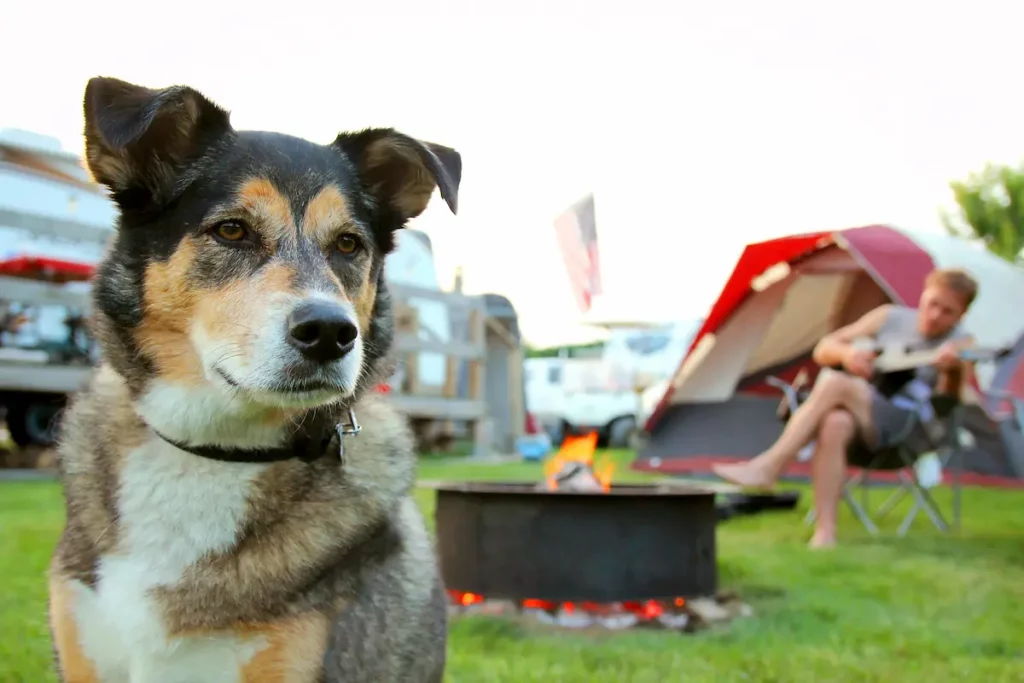12 Tips For Camping With an Anxious Dog
Dogs experience anxiety at various levels, and they can respond to it in a variety of ways. It’s crucial for you to know where your dog falls on the continuum and what they’re capable of as their owner. Consider not taking your dog on a camping trip if you know he or she is terrified of strangers, other pets, the woods, or other things that would undoubtedly occur.
Forcing them into circumstances they aren’t prepared for is just setting your trip and your furry buddy up for failure. If you want to obtain long-term improvements by working on your pet’s flexibility with new situations, you must approach them gradually and with proper preparation. Make sure your dog is ready for a camping trip before you set out. If you’re not sure they’ll be able to handle it, entrusting them to a trusted friend or relative who knows how to care for them would benefit you both.
Camping is similar to having the option of a second home, but wherever you may want it to be. When summer approaches, everybody wants to go camping with their pets. This article is for you if you have a nervous dog and are concerned about going camping with him. Because of their fear, anxious dogs are more likely to like camping a lot less than their more easygoing counterparts.

Related Reading: Tips When Taking Your Puppy Camping
Here are our top camping tips for dogs who are nervous:
1. Pay Attention:
If your dog is suffering from anxiety, then you have to learn more about your dog. You
should try to determine why your dog is experiencing anxiety. If they were adopted from a shelter or another home, then your knowledge may be limited. Otherwise, you can do proper research on why your dog is experiencing anxiety, especially specific to your dog’s breed if that is a common trait for your dog (i.e. Chihuahuas). You can check out tips for how to reduce this anxiety once you’re able to determine what is creating it.
2. Train Your Dog:
Before embarking on a camping trip, you should train your dog by attending obedience school and/or spending dedicated time working on basic commands. By doing this, you will naturally spend a lot more time focused on your dog and you are more likely to start to see the reason for anxiety in your dog.
Your dog will also spend time with you and there may be a chance to overcome his anxiety (especially if it is abandonment or separation-related). If your dog is trained then he will also behave well in front of other people.
If you do not properly train your pooch, then he will not greet other people with well-mannered or welcoming behavior and runs the risk of being yelled at; thus increasing the potential for his anxiety to be triggered.
Some of the links in this post are affiliate, and we may earn a commission.
3. Check Weather Conditions:
Do not forget to check weather conditions before you set off on a camping trip. Maybe you have planned camping on a weekend when the forecast is calling for a huge thunderstorm or rain. Your dog is already facing anxiety, due to a new environment and/or car travel.
So, after seeing lightning bolts and hearing thunder through the thin walls of your tent, he may become unbearably stressed and become a “flight risk”. In the event of unpredictable inclement weather, you should have extra jackets, flashlights, blankets, and anxiety medications on hand for your dog in case they are needed.
4. Have a Dog First Aid Kit:
Nature is unpredictable and the same is true of a dog. When you are packing your gear for camping, don’t forget to add a doggy first aid kit. This will also be helpful if your dog gets injured. It is recommended to have a doggy first aid kit with you whether your dog experiences anxiety or not.
You never know when you may need bandages, allergy medication, or extra water for your furry friend. Before setting out on your camping trip, you should save the contact number of a vet stored in your phone, in case you need to contact them when you do not have access to the internet.
5. Do Not Yell:
Shouting and yelling at your pet can cause unnecessary increased stress on your pet. Try to remain calm in front of them. If you are training them, your tone and gestures must be consistent so that they may feel secure around you.
Overall, you should try to reduce the anxiety of your pet by greeting them in a welcoming manner and by using a soft tone.
6. Private Campsite:
It should be noted that notevery camping site is suitable for an anxious dog. When your dog is facing anxiety, you should always try to choose a private campsite for your trips together. In a densely populated area, you run the risk of added stress from other dogs and an abundance of people and children as well as the risk that your dog will bark at everyone.
So, your chosen site should be private to allow your dog to feel relaxed. It should be a peaceful destination for you and your dog alike.
7. Provide Your Dog a Safe Place:
When you camp, try to provide your dog with their own safe place. While packing gear for camping, do not forget to include a blanket/bed and favorite toy for your dog. After reaching your final destination, lay down the blanket and put his favorite toys in front of him, and assure him that he is safe there with you. In this way, your pet will become less anxious. Keep your dog safe, dry, and moderately temperate in warm and cold weather.
8. Exercise:
Daily exercise, even when away from home, is a really helpful habit for your dog’s physical and mental health. You are providing your pet with the best food and he is gaining energy from that healthy food. If this energy is not utilized, then it can translate into an abundance of nervous energy. Human beings have so many reasons to worry; like: bills, jobs, relationship tensions, children, etc., but this is not so in the case of dogs.
They become worried if they do not get proper attention or get yelled at when they start barking at everyone around them. Allow them to walk, run and play around you. Take them for a morning walk along you so that they may feel fresh and active and use their energy for a positive purpose.
9. Socialize Them:
Before you go camping with your dog, try to understand the level of fear or nervousness in your dog. Some dogs become anxious when they see other dogs around them. Before setting off on a trip, try to ensure that you have socialized your dog to other dogs and to children. Introduce them, in a safe and controlled manner, to new pets and new people.
They might become nervous at first, but they will enjoy this new experience over time. Treat them kindly and with patience while interacting with other pets. Try to praise them and reduce their anxiety by allowing them to play with other pets in a free manner. Afterwards, when you take them camping they will be prepared for a variety of different situations and you can be comfortable knowing how they are likely to react.
10. Do Not Punish Them:
By punishing your pet for bad behaviour, you may create a negative association and memory of camping. Yelling at your dog may trigger them to start barking and even to snap or bite at you. This is especially true if your dog has a history of these behaviours when stressed by a new environment.
If you encounter this type of situation on a camping trip, just try to diffuse the situation and revert back to the training you taught your dog. Remember that your dog is not bad, he is just scared. There is no need to punish your dog by yelling or striking him. Just try to remain calm and use soothing tones to calm the situation instead of escalating it.
11. Create an Exit Strategy:
No one knows your dog’s anxiety triggers better than you. If you know that certain circumstances can make them extremely fearful, you should devise a strategy to prevent it by keeping them out of that scenario or by having a plan to leave if it arises. For example, if your dog is terrified of other dogs, you should be mindful to the presence of other dogs and be ready to leave the campsite if there is an issue.
This is another case where ensuring you are at a private campsite before heading out on your trip would be wise. When you take your dog out on a trail or into a common area to use the restroom, you should always be on the lookout for other dogs and ensure you keep your distance from them to avoid a confrontation. Bring a toy or other positive diversion to divert your dog’s attention away from other dogs in the area.
Basically, keep an eye out for circumstances that can create distress and take action to prevent the situation from worsening BEFORE your dog has a reaction and not after.
12. Pack Toys:
There will inevitably be some downtime for you and Fido during your camping trip because you won’t be hiking, swimming, or exploring for the entire time. That’s why it’s important to be prepared to entertain your dog when you’re cooking on the campfire or relaxing with a good book.
Bring toys for your dog to keep him entertained during your camping trip and to give him a sense of normalcy akin to what he has in your own backyard or neighbourhood park.
In Conclusion:
You’ll find that going to camp with your dog is a lot more enjoyable if you focus on meeting their needs first. By following our easy list of tips, you will ensure that both you and your pooch have a fun and stress-free camping trip. What are your favourite, pet-friendly, campsites? Leave us a comment and let us know!

Family Dog Expert Author
Hi there! I’m Stuart, a devoted dog lover and family dog expert with over a decade of experience working with our furry companions. My passion for dogs drives me to share my knowledge and expertise, helping families build strong, loving bonds with their four-legged friends. When I’m not writing for SirDoggie, you’ll find me hiking, playing with my beautiful dog, or studying music.
